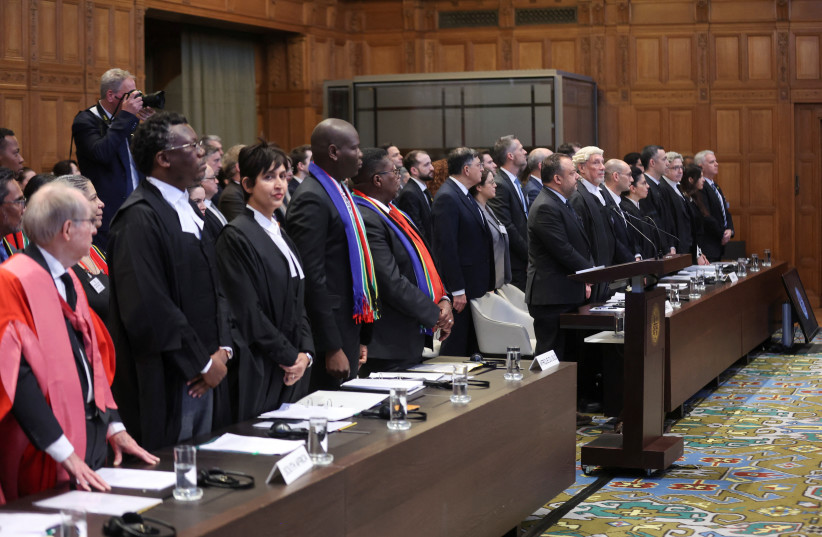The immoral and absurd complaint brought by South Africa – falsely charging Israel with genocide – and the majority’s incoherent preliminary decision highlight the deeply problematic nature of the International Court of Justice (ICJ) and related institutions.
The central problem is legitimacy, or rather its absence, in the case of the ICJ specifically, and more generally, regarding the so-called Law of Armed Conflict (LOAC) and the people and institutions claiming to speak for this enterprise.
In contrast to the legal and court systems of democratic countries, international law lacks basic political legitimacy. Instead, these institutions and individuals, including judges, prosecutors, and professors, are political actors who use soft-power warfare (aka lawfare, or propaganda) to accompany and amplify kinetic conflict (bombs and rockets) through the facade of a legal process.
The ICJ (like its newer counterpart – the International Criminal Court) is linked to the United Nations framework, and its 15 standing “judges” are selected or voted in by the Security Council and General Assembly. The countries that are judged (in this case, Israel) are not duly represented in the process – Israel gets one vote in the GA out of the over 190 UN member states, of which the majority are dictatorships and autocratic regimes, while the Islamic bloc has 55 votes. (For this reason, Israel has never been elected to the Security Council.)
There are no checks and balances, and judges are often political appointees with no real-world knowledge of the nature of warfare, deterrence, terrorism, or other issues on which they render pseudo-legal decisions.

The 'cult of international law'
While legitimate national legal systems are based on equality before the law, the members of what Prof. David Bernstein has coined the cult of international law, including many academics, have favorite causes. Some are motivated by dangerous messianism, which envisions criminalizing warfare through imaginary global frameworks. They market agreements that seek to ban various forms of warfare (i.e. chemical weapons and landmines) and tactics said to reflect “disproportionate force” and collective punishment, both inherently subjective terms.
Treaties and conventions create the illusion of rules under the rubrics of LOAC and International Humanitarian Law (IHL), but these are, at best, selectively enforceable. States that face legitimate threats and rely on such weapons to deter or defeat real enemies are nevertheless said to be required to conform through a fiction known as “customary international law.”
FOR THE ideological wing of international law activists, the driving force is a belief system known as post-colonialism. In this framework, Western nations are automatically classified as immoral oppressors, and the use of force, regardless of the circumstances (such as in responding to terror attacks), is condemned as war crimes and similar evils. In parallel, the predefined “victims” of colonialism are exempt from accusations of war crimes, notwithstanding the brutality which they exhibit.
Israel is the central target of this ideology, expressed through the labels of “genocide,” “apartheid” and many other evils. Israeli victims of brutal slaughter are systematically erased and the Palestinian perpetrators are portrayed blandly as “militants,” while terror-enabling UN agencies and “humanitarian aid groups” become sacred causes. Similarly, Iran and its proxies, which are, in fact, genocidal, are rarely, if ever, the focus of denunciations from the international law and human rights industry.
The power of the international law industry reflects the money it raises from wealthy naive believers and virtue signalers, as well as the false image of altruism, known as the “halo effect.”
The vast sums support slick marketing campaigns, enlisting journalists and major media platforms to the cause. When Ken Roth – an industry leader obsessed with Israel – ran Human Rights Watch (1993-2022), he raised annual budgets that reached $100 million, with significant “contributions” from a corrupt Saudi billionaire and, according to recent revelations, from Qatar. (HRW’s donor list is a highly guarded secret – a practice that is clearly incompatible with “progressive” principles.)
Amnesty International, HRW’s London-based counterpart, has an annual income of more than €300 million, including from governments, thus belying the “non-governmental” (NGO) mask.
And numerous allied NGOs, embracing the same anti-Western and anti-Israel agendas, are generously supported by European governments under the fictions of “civil society” and human rights. Blatantly false or unverifiable accusations are packaged as “research reports,” parroted by journalists, and incorporated in United Nations and international court documents. Prominent examples include the discredited Goldstone Report on Gaza (2009), and now, the ICJ preliminary majority decision on Israel, Hamas, and “genocide.”
At many universities, the international law programs and clinics are similarly populated by powerful messianists and post-colonial ideologues with close ties to the same NGO superpowers. Faculty members cultivate wealthy donors and indoctrinate students, hiding the absence of legitimacy and the inherently hand-waving intellectual and moral foundations. The ambitious and politically connected teachers become government officials or are appointed as prosecutors or judges in the ICJ or ICC.
For these reasons, beyond countering the ICJ “genocide” farce, it is important to expose the wider illusion of “international law,” including the lack of democratic legitimacy as well as the messianic and ideological foundations. Institutions like the ICJ are built on the illusion of legality and justice. In practice, the results are often injustice and immorality.
The writer is professor emeritus of political science at Bar-Ilan University and president of NGO Monitor.
